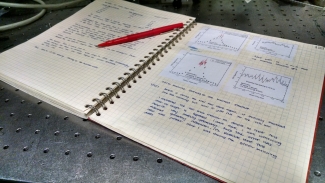The American Association of Physics Teachers identifies "communicating physics" as a key learning outcome of undergraduate physics lab courses. Many lab instructors strive to provide opportunities for their students to communicate results and ideas in written and verbal forms authentic to the discipline (e.g., lab notebooks, oral presentations, written papers/articles, poster presentations).
Our research in this area focuses on written communication. We investigate the goals for writing in lab classes, possible implementation of writing in project-based labs, students' views about, and experiences with, writing, physics researchers' development of lab notebook documentation skills, and best practices for incorporating authentic documentation practices into lab courses.



 The Physics Frontiers Centers (PFC) program supports university-based centers and institutes where the collective efforts of a larger group of individuals can enable transformational advances in the most promising research areas. The program is designed to foster major breakthroughs at the intellectual frontiers of physics by providing needed resources such as combinations of talents, skills, disciplines, and/or specialized infrastructure, not usually available to individual investigators or small groups, in an environment in which the collective efforts of the larger group can be shown to be seminal to promoting significant progress in the science and the education of students. PFCs also include creative, substantive activities aimed at enhancing education, broadening participation of traditionally underrepresented groups, and outreach to the scientific community and general public.
The Physics Frontiers Centers (PFC) program supports university-based centers and institutes where the collective efforts of a larger group of individuals can enable transformational advances in the most promising research areas. The program is designed to foster major breakthroughs at the intellectual frontiers of physics by providing needed resources such as combinations of talents, skills, disciplines, and/or specialized infrastructure, not usually available to individual investigators or small groups, in an environment in which the collective efforts of the larger group can be shown to be seminal to promoting significant progress in the science and the education of students. PFCs also include creative, substantive activities aimed at enhancing education, broadening participation of traditionally underrepresented groups, and outreach to the scientific community and general public.